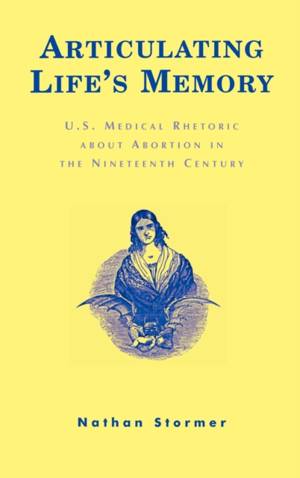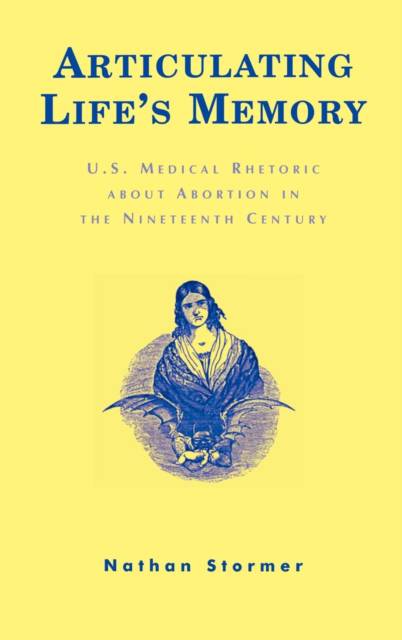
Door een staking bij bpost kan je online bestelling op dit moment iets langer onderweg zijn dan voorzien. Dringend iets nodig? Onze winkels ontvangen jou met open armen!
- Afhalen na 1 uur in een winkel met voorraad
- Gratis thuislevering in België vanaf € 30
- Ruim aanbod met 7 miljoen producten
Door een staking bij bpost kan je online bestelling op dit moment iets langer onderweg zijn dan voorzien. Dringend iets nodig? Onze winkels ontvangen jou met open armen!
- Afhalen na 1 uur in een winkel met voorraad
- Gratis thuislevering in België vanaf € 30
- Ruim aanbod met 7 miljoen producten
Zoeken
Articulating Life's Memory
U.S. Medical Rhetoric about Abortion in the Nineteenth Century
Nathan Stormer
Hardcover | Engels
€ 208,95
+ 417 punten
Uitvoering
Omschrijving
Articulating Life's Memory offers a unique view of the history of abortion in early America. Nathan Stormer's work moves beyond general histories of medicine, science, and women; it provides specific insight into how the earliest medical writings on abortion served to create cultural memory. Nineteenth-century medical texts presented the act of abortion as a threat to the carefully circumscribed concepts of nation and race. Stormer analyzes a wealth of literature (and illustrations) from the period to explore the rhetorical techniques that led early Americans to presume that abortion put the integrity of all of American culture at risk. The book's first part provides a layered context for understanding medical practices within the rhetoric of memory formation and sets early antiabortion efforts within the wider framework of nineteenth-century biopolitics and racism. In Part II of the study, Stormer examines the substance of the memory constituted by these early medical practices. Making a major contribution to the study of rhetoric, Articulating Life's Memory will be invaluable to scholars researching reproductive rights and feminist and cultural histories of medicine.
Specificaties
Betrokkenen
- Auteur(s):
- Uitgeverij:
Inhoud
- Aantal bladzijden:
- 256
- Taal:
- Engels
Eigenschappen
- Productcode (EAN):
- 9780739104293
- Verschijningsdatum:
- 16/10/2002
- Uitvoering:
- Hardcover
- Formaat:
- Genaaid
- Afmetingen:
- 174 mm x 236 mm
- Gewicht:
- 503 g

Alleen bij Standaard Boekhandel
+ 417 punten op je klantenkaart van Standaard Boekhandel
Beoordelingen
We publiceren alleen reviews die voldoen aan de voorwaarden voor reviews. Bekijk onze voorwaarden voor reviews.











